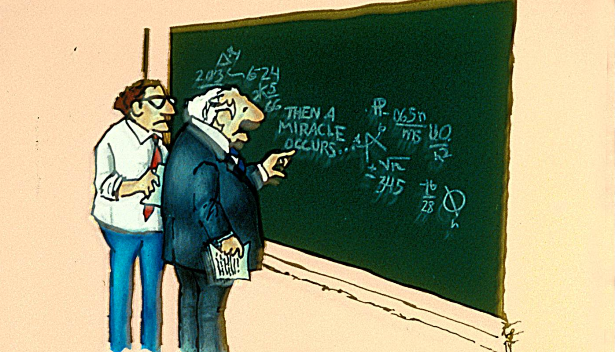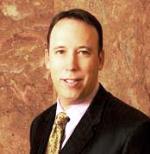
© Sidney Harris, used with permission.
Guest blog by Christopher Barron, CIO, W&T Offshore.
 I love this old cartoon that features a mathematician creating a very important, complex equation. He has filled a blackboard full of numbers and symbols, and right in the middle of the equation there is a statement that says, “Then a miracle occurs.” To those wondering how they can get to the top positions within a company, such as CIO, it may often seem like some kind of magic is needed somewhere along the way.
I love this old cartoon that features a mathematician creating a very important, complex equation. He has filled a blackboard full of numbers and symbols, and right in the middle of the equation there is a statement that says, “Then a miracle occurs.” To those wondering how they can get to the top positions within a company, such as CIO, it may often seem like some kind of magic is needed somewhere along the way.
Over the years I have spoken to many people who’ve expressed interest in becoming senior leaders. Many of them want to know how to manage their careers in order to achieve a position in the C-Suite. From these conversations I have distilled a “recipe” for how people can achieve their goals.
Before getting into the process, I must inject this disclaimer. Just as sports coaches cannot teach height or speed, not everyone is born to be a CxO. The first and most important step on that journey is to be honest with one’s self. Upon self reflection each of us can make that true assessment – “Am I built to achieve such a role and do I really want it?”
Given that a person has the “right stuff”, I have developed a process that I call "HERD". Since becoming a senior leader is the opposite of following the “herd mentality”, the acronym adds just the right level of irony to make it stick. HERD stands for:
- H umility
- E ngagement
- R espect
- D iscipline
While different opinions abound, these qualities are consistently found in those people who want to ascend to the CIO role, or for that matter, any of the top rungs on the corporate ladder.
Humility – In order to gain the skills and opportunities to get to the top, you will have to learn a great deal, and learn continually. Even if you graduated from the top of your class at Harvard, I can guarantee that there is a taxi driver out there somewhere who knows more about relationships than you do. A person who shows humility opens up opportunities to learn from anyone. I grew up in a farming community where most people come home from work covered in dirt and grease. Although I have two Master’s degrees, to this day I can ask any of these men and women about how to solve problems and will get great answers. If you can’t be humble, you will only succeed in closing yourself off to whole parts of the global community. When you can look everywhere for answers, your needs are met more quickly, and more often.
| “Great leaders are people whom others want to follow.” |
Engagement – You must get to know other people and find ways to learn and share their interests. Great leaders are people whom others want to follow. If you show that you’re interested in others, they will reciprocate. I remember when I first became a director, responsible for several hundred people. In order to understand the culture, I walked through the work areas of the staff engineers, many of who had been there for 25+ years. I spent time learning from them the important aspects of the corporate dynamic. Yes, I engaged heavily with my staff and leadership, but I also took the time to get different perspectives. My engagement with those engineers paid enormous dividends.
Respect – This topic should be a no brainer yet we all see people every day who are lacking this quality. A great motto by which to live could be summarized, “Everyone deserves your respect until the day they prove to be unworthy.” As I educate my own children I emphasize certain points about respect. One of them goes like this:
Everyone that you encounter is going to play some part in your life, be it large or small. We all know what life would be without the star athlete, the movie star, the President of the United States, or our doctor. But imagine life if the janitor stopped cleaning the bathroom or the day laborer stopped stocking shelves at the grocery store.
Showing respect is a great way of demonstrating that you deserve respect. Try finding a great leader anywhere who does not respect the people she leads.
Discipline – In order to achieve great things, one must be willing to consistently put forth the effort required. Goal setting is part of this process as is the need to achieve things that others would simply not attempt. Early in my career I learned the power of setting goals. One day I was discussing with another colleague all the things we wanted to achieve in our careers. He told me that he wanted to earn $70,000 a year by his 30th birthday (he was 25 at the time). Over the next few years I watched him doggedly put into place all the pieces that would position him to realize that goal. He got up early, went to bed late, and generally attempted to outwork any barrier that he encountered. Because my colleague was determined and had discipline, he beat his timeline by two years.
I was 27 when my friend and I had that conversation and my goal at the time was to reach the position of CIO as early as possible. From personal reflection, I concluded that my educational credentials were lacking. Knowing that I needed to set goals to “stretch” my capabilities, I went on to earn two Master’s degrees, a six sigma black belt, a project management certification, and several other distinctions over the proceeding five years. I achieved my goal of becoming a CIO when I was age 33.
I am not saying that my achievements should be your goals. Rather, you must be willing to discipline yourself to do what it takes, work as hard as necessary to achieve realize your C-suite ambitions.
Just as every person is unique, so will be his or her path to the top of the corporate ladder. By following the HERD process you will have an idea of what it takes to achieve your goals and become the type of leader that is in such demand today.
Christopher Barron has been a CIO in the energy sector for over a decade and is currently Vice President of Information Technology & CIO at W&T Offshore. He is the author of the book, The Talent Triangle.

Written by Martha Heller
Martha Heller is CEO of Heller and author of Be the Business: CIOs in the New Era of IT, and The CIO Paradox: Battling the Contradictions of IT Leadership.


